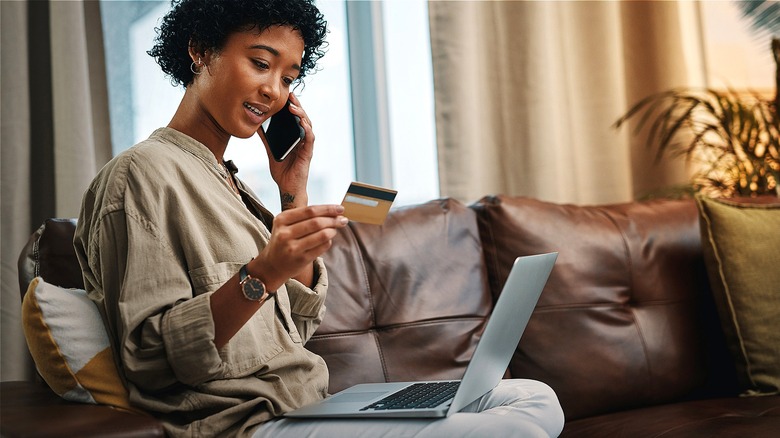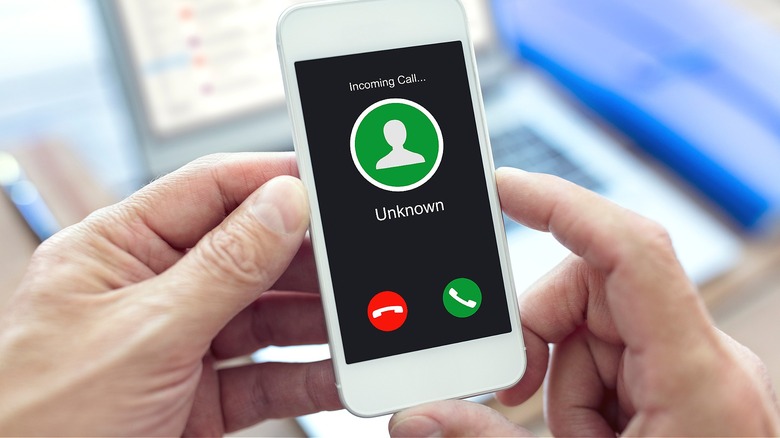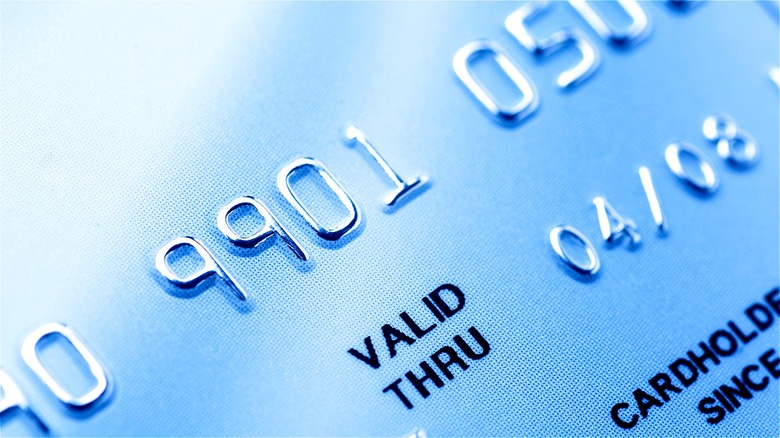You May Want To Think Twice Before Paying Over The Phone
According to the Pew Research Center, 97% of Americans have a cell phone of some kind, while 85% have a smartphone. Forbes Advisor, meanwhile, reports that 53% of Americans opt for using digital payments over traditional forms of payment, such as cash or swiping a credit or debit card. What's more, over 70% of respondents named digital wallets as their preferred form of payment when shopping. While virtual payment is obviously popular and gaining in use, you can also, of course, use a phone to make a payment over the phone. However, the next time you do, you may want to take a few precautions.
Paying over the phone may seem outdated in the 2020s, but, actually, it remains a major part of a business's multi-channel approach to sales and customer service. Why limit the way customers can pay for their products? Also, some merchants — especially small businesses — may not be set up to accept mobile orders, and so placing orders over the phone is the only way. Restaurants, of course, also commonly take orders and payment over the phone.
Further, many people may want to call in their orders and pay by phone, too, since they'll be able to also ask questions and receive instructions, such as when to expect the order and what to do once the item arrives. So, even today, the phone transaction remains a not-uncommon way to pay for things. With this said, various more scams exist that target mobile phone technology so, when paying over the phone, it's important to be careful and take steps to protect your money, credit, and identity.
Who exactly is calling you?
In a case where you contacted the business yourself, such as a takeout restaurant, a retailer, or a hospital, then you can feel safe that the person you're dealing with is legitimately from billing and/or customer service. Sharing your credit card information with these individuals is a safe endeavor.
However, if someone reaches out to you, perhaps claiming they represent a business, like a credit card company, don't trust it. As the Federal Trade Commission warns us, scammers have found all kinds of ways to fool financial victims into believing the random call is legitimate. Common scams include impersonator scams, where scammers pretend to be from a government agency, an internet service provider, or a distant relative, to name a few; debt relief and credit repair scams; prize and lottery scams; and charity scams. If you receive a call like this, always question it and never give away your personal information, such as your Social Security number or credit card.
Also, what was the caller ID? Fortunately, phones today can alert you when some number seems suspicious, with messages like "suspected spam caller." But, even then, scammers have figured out how to get this around at times with strategies like call spoofing, where their identity is disguised (e.g., the number looks to be local but it's actually from another state or country). Should someone contact you out of the blue, hang up and call the number back. Does it go to the actual IRS? No? Then report the number to the FTC.
Is someone else listening?
According to the FTC's 2022 report on consumer complaints, identity theft was the number one complaint in the U.S., with 1,108,609 reports, which accounted for 21.52% of all complaints. The main source of identity theft complaints were credit cards, with 441,882 reports.
With this said, another time you'll want to think twice before sharing your credit card information over the phone is if you're not somewhere private. If you've come to the point in your conversation when it's time to give your card information out, make sure you're somewhere where others can't overhear your card's details. If you're in a public space, perhaps consider pausing your "card not present" transaction until you get back home.
If you find your card has been compromised, and your is identity stolen, it's important you know your rights. Per the Fair Credit Billing Act, cardholders can only be held responsible for $50 of any unauthorized transactions. This said, the majority of credit card companies have a zero liability policy in such cases.
What to do when paying over the phone
Mandated by the major credit card companies, payment card industry (PCI) compliance requires merchants to handle credit card information in specific ways to ensure the safety of the cardholder's information. For example, merchants must delete your card's security code (CVV) once it's used to authorize a purchase. So, while using a credit card over the phone should be safe, you should still take steps to ensure you're protected as well.
If you give your credit card information out over the phone, always request the person fully read it back to you. For example, if you subscribe to a newspaper after talking with customer service, have the person read back everything relevant to the transaction, i.e., the total amount your card will be charged, the start date of the subscription, when your next charge will be, and when the promo ends (if you are using one). However, a PCI-compliant business should provide this info to you already.
Further, after your phone call, check your credit card to see how much you were charged. Note, it could take three days or so for a pending credit card charge to go through. In that time, if you find a discrepancy, contact the business back to resolve the problem. Also, regularly checking your credit card activity is a simple way to spot anything that you didn't authorize.



